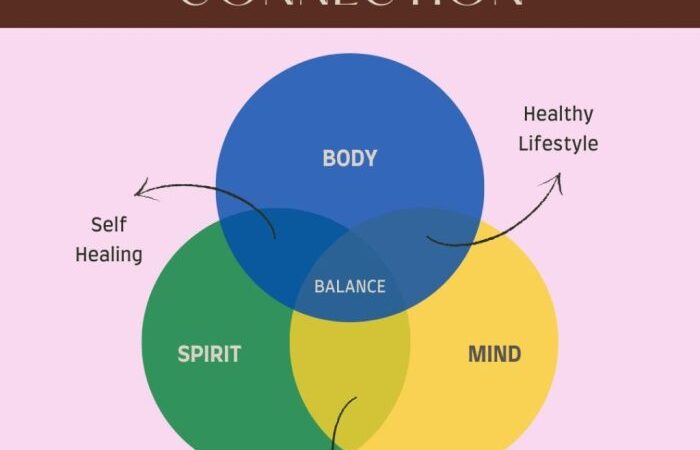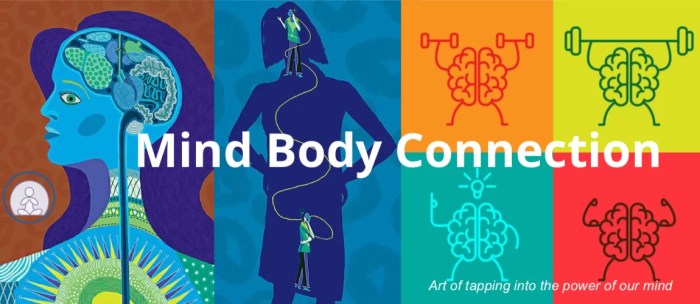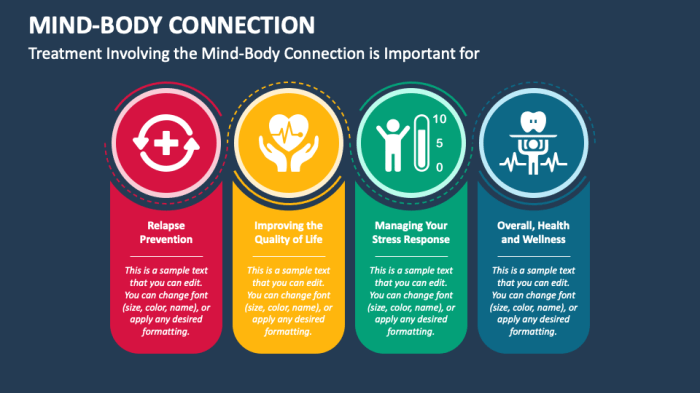Mind-Body Connection: A Pathway to Wellness

The mind-body connection in wellness explores the intricate relationship between our thoughts, emotions, and physical well-being. This connection is not a new concept; ancient philosophies and practices have long recognized the interconnectedness of the mind and body. However, modern science is now providing concrete evidence to support this ancient wisdom, demonstrating how our mental states can profoundly impact our physical health.
From the way we perceive stress to how we respond to illness, the mind-body connection plays a crucial role in shaping our overall health and well-being. By understanding this connection, we can unlock the potential to cultivate a healthier and more fulfilling life.
Understanding the Mind-Body Connection

The mind-body connection is a fundamental concept in wellness that emphasizes the intricate relationship between our thoughts, emotions, and physical health. It acknowledges that our mental and physical states are not separate entities but rather interconnected aspects of a unified system.
Understanding this connection allows us to explore how our thoughts, feelings, and beliefs can impact our overall well-being.
Historical Understanding of the Mind-Body Connection
The concept of the mind-body connection has roots in ancient philosophies and medical traditions. For centuries, cultures around the world have recognized the influence of the mind on the body. Ancient Greek philosophers, such as Plato and Hippocrates, emphasized the importance of a balanced mind and body for optimal health.
In traditional Chinese medicine, the concept of Qi, or vital energy, highlights the interconnectedness of physical and mental well-being.
Scientific Evidence Supporting the Mind-Body Connection
Modern science has provided substantial evidence supporting the interconnectedness of mental and physical health. Studies have shown that stress, anxiety, and depression can have a significant impact on the body’s physiological processes, contributing to various health problems. For instance, chronic stress can lead to elevated levels of cortisol, a hormone that can suppress the immune system, increase blood pressure, and contribute to weight gain.
Examples of How Thoughts, Emotions, and Beliefs Influence Physical Well-Being
The mind-body connection manifests in numerous ways, influencing our physical health through various mechanisms. Here are some examples:
- Stress and Immune System: Chronic stress can weaken the immune system, making us more susceptible to infections and diseases.
- Emotions and Heart Health: Negative emotions, such as anger and hostility, have been linked to an increased risk of cardiovascular disease.
- Beliefs and Pain Perception: Our beliefs and expectations can influence how we perceive and experience pain. Positive beliefs and a sense of control can help manage pain more effectively.
- Placebo Effect: The placebo effect demonstrates the power of our minds to influence our physical responses. When we believe a treatment will be effective, it can often lead to real physiological changes.
Impact on Wellness
The mind-body connection is not just a philosophical concept; it has a profound impact on our overall health and well-being. Our thoughts, emotions, and behaviors directly influence our physical health, and vice versa. Understanding this interconnectedness is crucial for achieving holistic wellness.
The Influence of Stress and Negative Emotions
Stress, anxiety, and negative emotions can have a significant impact on our physical health. When we experience stress, our bodies release hormones like cortisol, which can lead to various physical symptoms such as:
- Increased blood pressure
- Elevated heart rate
- Muscle tension
- Weakened immune system
- Digestive issues
- Sleep disturbances
Chronic stress can even contribute to the development of serious health conditions like heart disease, stroke, and depression.
The Power of Mindfulness and Positive Thinking
Mindfulness and positive thinking play a crucial role in promoting physical and mental well-being. Mindfulness involves being present at the moment and paying attention to our thoughts, feelings, and sensations without judgment. This practice helps us manage stress, reduce anxiety, and improve our overall emotional regulation.
“Mindfulness is the practice of paying attention in a particular way: on purpose, in the present moment, and non-judgmentally.”
Jon Kabat-Zinn
Positive thinking, on the other hand, involves focusing on the good aspects of our lives and cultivating optimistic beliefs. This can help us cope with challenges, enhance our resilience, and improve our overall mood. Studies have shown that practicing mindfulness and positive thinking can lead to:
- Reduced stress and anxiety
- Improved sleep quality
- Enhanced immune function
- Increased self-awareness and emotional regulation
- Greater sense of well-being and happiness
Practices for Cultivating Mind-Body Harmony: Mind-body Connection In Wellness
Cultivating mind-body harmony is a journey that involves consciously integrating your physical, mental, and emotional well-being. By engaging in practices that bridge the gap between these aspects, you can create a sense of balance and wholeness within yourself. This section will explore various practices that can help you achieve this harmony.
Mind-Body Practices for Wellness
Mind-body practices offer a structured approach to cultivating harmony between your mind and body. These practices often involve physical movement, breathwork, and mindfulness techniques, fostering a sense of inner peace and well-being.
| Practice | Benefits |
|---|---|
| Yoga | Improves flexibility, strength, and balance; reduces stress and anxiety; promotes relaxation and sleep; enhances self-awareness. |
| Meditation | Reduces stress and anxiety; improves focus and concentration; enhances emotional regulation; promotes self-compassion. |
| Tai Chi | Improves balance, coordination, and flexibility; reduces stress and anxiety; enhances cardiovascular health; promotes relaxation and sleep. |
| Qigong | Improves energy flow and circulation; reduces stress and anxiety; enhances immune function; and promotes relaxation and sleep. |
Incorporating Mindfulness into Daily Routines, Mind-body connection in wellness
Mindfulness involves paying attention to the present moment without judgment. By incorporating mindfulness into your daily routine, you can cultivate a greater awareness of your thoughts, feelings, and sensations, fostering a sense of calm and centeredness. Here are some practical ways to integrate mindfulness into your daily life:
- Mindful Breathing: Take a few moments throughout the day to focus on your breath. Notice the rise and fall of your chest and abdomen, and observe the sensations of each inhale and exhale. This simple practice can help ground you in the present moment and calm your mind.
- Mindful Eating: Pay attention to your food as you eat. Notice the colors, textures, and flavors. Chew slowly and savor each bite. This practice can enhance your enjoyment of food and promote a healthier relationship with eating.
- Mindful Walking: As you walk, focus on the sensations of your feet on the ground, the movement of your body, and the sights and sounds around you. This practice can help you connect with your body and appreciate the present moment.
- Mindful Body Scan: Sit or lie down comfortably and bring your attention to your body. Starting with your toes, scan your body, noticing any sensations, such as warmth, tingling, or tightness. This practice can help you become more aware of your physical state and release tension.
Managing Stress and Promoting Relaxation
Stress can have a significant impact on both your physical and mental well-being. By adopting strategies to manage stress and promote relaxation, you can create a more balanced and harmonious state of being.
Physical Activity and Stress Management
Regular physical activity can be an effective way to manage stress and promote relaxation. Exercise releases endorphins, which have mood-boosting effects, and helps to reduce cortisol levels, the stress hormone.
- Cardiovascular Exercise: Activities like running, swimming, or cycling can help elevate your heart rate and release endorphins, reducing stress and improving mood.
- Strength Training: Lifting weights or engaging in other forms of resistance training can help to build muscle mass and increase bone density, reducing stress and improving overall fitness.
- Yoga and Tai Chi: These practices combine physical movement with mindfulness, promoting relaxation and reducing stress. The gentle movements and focus on breath can help to calm the mind and release tension.
Healthy Lifestyle Choices for Relaxation
In addition to physical activity, making healthy lifestyle choices can also contribute to stress management and relaxation.
- Adequate Sleep: Getting enough sleep is essential for physical and mental health. Aim for 7-9 hours of quality sleep each night to allow your body and mind to rest and rejuvenate.
- Balanced Diet: Consuming a balanced diet rich in fruits, vegetables, whole grains, and lean protein can provide your body with the nutrients it needs to function optimally and cope with stress.
- Limit Caffeine and Alcohol: Caffeine and alcohol can disrupt sleep and increase anxiety, making it harder to manage stress. Limit your intake of these substances to promote relaxation and better sleep.
- Practice Relaxation Techniques: Incorporate relaxation techniques into your daily routine, such as deep breathing exercises, meditation, or progressive muscle relaxation, to help calm your mind and body.
The Role of Lifestyle Factors
Our lifestyle choices significantly influence the intricate dance between our minds and bodies. The decisions we make daily, from what we eat to how we move, shape our overall well-being and contribute to a harmonious mind-body connection.
Diet and Mind-Body Connection
The food we consume provides the building blocks for our physical and mental health. A balanced diet rich in fruits, vegetables, whole grains, and lean protein nourishes the body and supports brain function.
Impact on Mental Health:
A healthy diet can improve mood, reduce stress, and enhance cognitive function.
Studies show a link between diets high in processed foods, sugar, and unhealthy fats and increased risk of depression, anxiety, and cognitive decline.
Conversely, diets rich in omega-3 fatty acids, found in fatty fish and walnuts, have been associated with improved mood and cognitive function.
Impact on Physical Health
A balanced diet can help maintain a healthy weight, reduce the risk of chronic diseases such as heart disease, diabetes, and certain types of cancer, and improve energy levels.
A healthy gut microbiome, fostered by a diverse diet, is linked to better mental and physical health.
Sleep and the Mind-Body Connection
Adequate sleep is essential for both physical and mental well-being. During sleep, our bodies repair and rejuvenate, while our brains process information and consolidate memories.
Impact on Mental Health:
Chronic sleep deprivation can lead to mood swings, irritability, difficulty concentrating, and an increased risk of depression and anxiety.
Sufficient sleep improves emotional regulation, enhances creativity, and boosts cognitive function.
Impact on Physical Health
Lack of sleep weakens the immune system, increases the risk of chronic diseases such as heart disease, diabetes, and obesity, and can lead to premature aging.
Adequate sleep promotes healthy hormone balance, regulates appetite, and improves physical performance.
Exercise and the Mind-Body Connection
Regular physical activity has a profound impact on both our physical and mental health. Exercise releases endorphins, which have mood-boosting effects, and improve brain function.
Impact on Mental Health:
Exercise can reduce stress, anxiety, and depression.
It improves self-esteem, boosts energy levels, and enhances cognitive function.
Impact on Physical Health
Exercise strengthens muscles and bones, improves cardiovascular health, reduces the risk of chronic diseases, and helps maintain a healthy weight.
It improves sleep quality and can reduce pain and stiffness associated with chronic conditions.
Social Connections and Community Support
Humans are social creatures, and our connections with others play a vital role in our well-being. Strong social support networks provide a sense of belonging, reduce stress, and promote resilience.
Impact on Mental Health:
Social isolation and loneliness are linked to increased risk of depression, anxiety, and cognitive decline.
Strong social connections provide emotional support, reduce stress, and promote feelings of happiness and well-being.
Impact on Physical Health
Social support networks can encourage healthy lifestyle choices and provide motivation to engage in healthy activities.
Studies show that people with strong social connections tend to live longer and healthier lives.
Environmental Factors and Well-being
Our surroundings have a significant impact on our mental and physical health. Spending time in nature, particularly in green spaces, can reduce stress, improve mood, and enhance cognitive function.
Impact on Mental Health:
Exposure to nature can reduce anxiety, improve attention, and promote feelings of peace and tranquility.
Green spaces provide opportunities for physical activity, social interaction, and relaxation, all of which contribute to mental well-being.
Impact on Physical Health
Spending time in nature can lower blood pressure, reduce stress hormones, and improve sleep quality.
Exposure to sunlight helps regulate our circadian rhythm and promotes the production of vitamin D, which is essential for bone health.
The Mind-Body Connection in Specific Conditions

The intricate interplay between our thoughts, feelings, and physical well-being is particularly evident when we consider specific conditions. Understanding how the mind and body influence each other can provide valuable insights into managing chronic pain, illness, and mental health challenges.
Chronic Pain and Illness
Chronic pain and illness often involve a complex interplay of physical, psychological, and social factors. The mind-body connection plays a crucial role in how we perceive, cope with, and experience these conditions.
- Stress and Pain Perception: Chronic stress can amplify pain signals, making it more intense and persistent. This is because stress hormones like cortisol can sensitize the nervous system, making it more responsive to pain stimuli. Conversely, managing stress through relaxation techniques can help modulate pain perception and improve pain tolerance.
- Mindfulness and Pain Management: Mindfulness-based interventions, such as meditation and yoga, be effective in managing chronic pain. By focusing attention on the present moment, these practices can help reduce the intensity of pain, improve pain tolerance, and enhance overall well-being.
- Negative Thoughts and Pain Amplification: Catastrophizing thoughts and negative beliefs about pain can exacerbate pain perception and limit functional abilities. Cognitive behavioral therapy (CBT) can help individuals identify and challenge these negative thought patterns, leading to improved pain management and a greater sense of control.
Mental Health Conditions and Physical Health
Mental health conditions like depression and anxiety can have significant impacts on physical health. The interconnectedness of the mind and body means that emotional distress can manifest as physical symptoms, while physical health issues can also contribute to mental health challenges.
- Depression and Cardiovascular Health: Depression is associated with an increased risk of cardiovascular disease. This is partly due to the impact of depression on lifestyle factors such as smoking, poor diet, and lack of physical activity. Additionally, depression can directly affect cardiovascular function by increasing inflammation and altering heart rate variability.
- Anxiety and Gastrointestinal Issues: Anxiety can manifest as gastrointestinal symptoms such as nausea, diarrhea, constipation, and irritable bowel syndrome. The stress response triggered by anxiety can disrupt the normal functioning of the digestive system.
- Chronic Stress and Immune Function: Chronic stress can weaken the immune system, making individuals more susceptible to infections and illnesses. This is because stress hormones suppress immune cells and interfere with the body’s natural defense mechanisms.
Mind-Body Interventions for Recovery and Quality of Life
Mind-body interventions offer a holistic approach to supporting recovery and improving quality of life in various conditions. By addressing both the physical and psychological aspects of well-being, these practices can empower individuals to take an active role in their health journey.
- Yoga and Chronic Pain: Yoga combines physical postures, breathing techniques, and meditation, making it a valuable tool for managing chronic pain. It can improve flexibility, reduce muscle tension, and promote relaxation, leading to reduced pain perception and improved function.
- Meditation and Anxiety: Meditation has been shown to reduce anxiety symptoms by calming the nervous system and promoting a sense of inner peace. Regular meditation practice can help individuals manage anxiety-related thoughts and physical symptoms, leading to improved emotional well-being.
- Biofeedback and Stress Management: Biofeedback techniques allow individuals to monitor physiological responses such as heart rate, muscle tension, and skin temperature in real time. By gaining awareness of these responses, individuals can learn to control them, reducing stress and promoting relaxation.
Ending Remarks

As we delve deeper into the mind-body connection, we uncover a powerful tool for promoting overall wellness. By embracing practices that foster mental and emotional balance, we can positively influence our physical health and create a harmonious relationship between our mind and body.
Through mindfulness, stress management techniques, and lifestyle changes, we can unlock the potential for a healthier, happier, and more fulfilling life.
Comments are closed.